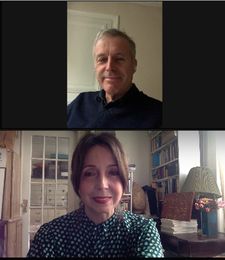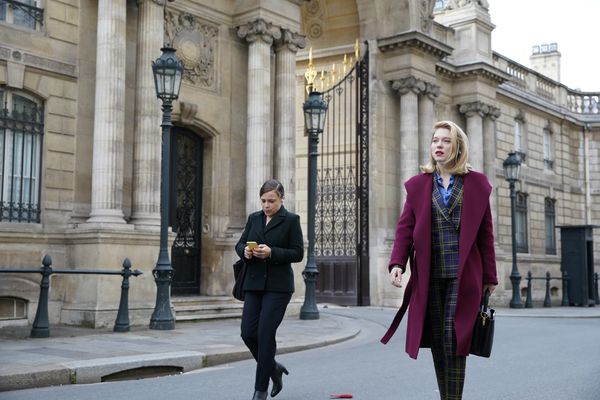 |
| Bruno Dumont on Lou (Blanche Gardin) and France (Léa Seydoux): “Lou’s character is absolutely sociologically exact. While the character of France can be very poetic …” |
In the first instalment with Bruno Dumont on France, we discussed his collaboration with composer Christophe, the writings of Charles Péguy, the nature of the character of Lou, the psychological role of music as used by Alfred Hitchcock, and going into space in the future.
Léa Seydoux plays France de Meurs, star anchor of a news program for the I channel. She jets to war zones, where she interviews puzzled refugees or soldiers instructed to react a certain way to staged situations. There is always a safe haven nearby for her and the crew, something with a swimming pool and cocktails, and back she flies to Paris to report to her many fans who don’t miss a chance to get a selfie, should they encounter her on the street.
There is France’s personal assistant Lou (Blanche Gardin), who emerges fully formed out of the land of PR hell. She embodies a certain type to a T with her snickers, her vaping, the way she holds her phone - the ultimate cynical sycophant who knows that the truth is of no importance whatsoever and will never be taken into consideration by her.
After being non-stop in the public eye, France decides to quit her job and retreats to a sanatorium in the Alps for some rest and reshuffling of the soul. This is not the Magic Mountain and the mental health patients France encounters do not resemble those described by Thomas Mann. Instead of finding comfort in the perfectly wrapped blankets of old, France seeks refuge in a stranger, Charles Castro (Emanuele Arioli).
Dumont skewers the hypocrisy of the television news world and rotates his protagonists slowly over the fire. The master director of casual cannibalism, singing saints, and floating detectives has his own take on the artifice of staged imagery, when lives are at stake and the world needs sincerity more than ever. Gardin’s Lou hovers, laughs, is nourished only by social media and embodies the monstrosity of our age.
The music by Christophe, as always with Dumont, carefully placed, oscillates between Hitchcockian elegance, wailing scream and ticking time bomb.
From France, Bruno Dumont joined me on Zoom for an in-depth conversation on France, a highlight of the 59th New York Film Festival in the Main Slate programme.
Anne-Katrin Titze: Let’s begin with what connects our previous conversations - Charles Péguy. What is it about Péguy that makes you revisit his writings in your films over the last few years with very different outcomes?
 |
| France (Léa Seydoux) with her I channel news crew in the countryside: “Art is transfiguration. It’s taking the ordinary to transfigure to grace.” |
Bruno Dumont: Yes, absolutely. When I made my previous films Jeannette and Jeanne, those were straight adaptations of Charles Péguy’s work. What interested me besides his prose, was his philosophy. Which is a way of conceiving the world to think about modernity. So when I wrote France with that title, it was a project that was full of Péguy’s philosophy.
To put it quickly, that grace is possible in a human way, in a totally non-religious human way. So I made this film and decided to tell this story in the milieu of journalism, why not? It’s the story of this woman’s trajectory and it shows us in a way the vicissitudes of existence and the possibility of redemption in a new way, that is human and not religious. And that is Charles Péguy.
AKT: Grace is possible, but not found where she is searching for it. France is going into the mountain sanatorium, which is a very Thomas Mann Magic Mountain scenario. You name the character she meets there Charles Castro, as if he were a stand-in for Hans Castorp. How does Thomas Mann enter into this search of grace being possible?
BD: Thomas Mann, not really. It was Charles Péguy who was my source. I think all writers are naturally driven to that search. And any work of art is a search. Cinema is a search. It searches in nature and mountains are an elevation. There are many ways that different arts and artists cross each other. I imagine that you have read Thomas Mann a great deal, and so you’re seeing these things in Mann. But the quest is universal.
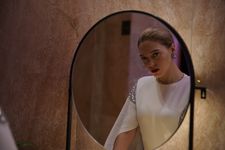 |
| Bruno Dumont on France (Léa Seydoux): “It’s the story of this woman’s trajectory …” |
France is looking for love. She goes looking for love in the mountains. Love is found where it is. It doesn’t matter whether it’s a guy with brown hair or with blond hair, it’s still love. What I’m interested in is the secular. I don’t believe in the quest for the absolute. I believe that one reaches things through things that are accidental, banal, secular - that is the solution in the quest for the absolute. I believe in the ordinary. The mountain is beauty and one can find that beauty and represent it whether it’s Bavaria or the flat areas of the Pas-de-Calais or the mountains in California. Beauty is where we are.
AKT: There’s a moment where France looks at a very ordinary field. It’s a field in autumn and she says it’s beautiful. We feel it because it’s cinema transforming landscape. Is that the point?
BD: You understood everything! That’s exactly it. Art is transfiguration. It’s taking the ordinary to transfigure to grace. The viewer can feel that. My job is to start the work, to make the frame, and the viewer takes it to the other side. So you’ve understood a thousand times.
AKT: Thank you, I’m very glad I did. With landscape I did. With people, I felt that Lou is the most realistic character of them all. I know Lou. With her smirk and her “ I don’t know what the truth is and why do you even worry about the truth”. She seems to be the most realistic , am I right with that one as well?
BD: You’ve won again! Indeed Lou’s character is absolutely sociologically exact. While the character of France can be very poetic, Lou is a sociologically accurate representative of a certain conjunction of intelligence and cynicism. She is a professional woman who knows her job extremely well, she’s extremely intelligent. She’s also terrifying with cynicism, meanness, contempt. This is the situation that we find in many media today.
Because we have the contradiction of what is intrinsically a noble profession, that of the journalist, and of an industrial profession that has to chase after an audience. This is the contradiction with many journalists today who have a noble profession that are in an industry which due to its chasing for an audience is pernicious. So that is a contemporary contradiction that the character of Lou embodies.
AKT: The music is fascinating. The mood it creates is at the same time Hitchcock, and a wailing scream, a ticking time bomb, and arcade noises. All of those are juxtaposed with each other. I noticed that you dedicated the film to Christophe. Can you talk a bit about the music?
BD: Yes, I had worked on Jeanne with Christophe and we’ve gotten along very well. What I liked about our work was that Jeanne is quite an obscure character and I had asked Christophe to illuminate her, to give her some light, to this secret character. I’m interested in music in film having that role.
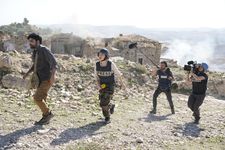 |
| Abdoul, her interpreter (Tristan Sadeghi) leads the way for France (Léa Seydoux), Lolo (Marc Bettinelli), and her cameraman |
That’s why you’re right to talk about Hitchcock because in the Fifties, film music played a psychological role that it no longer plays so much. That’s something that we have in France, that the music announces the end of the film. France, the character is going to go through many horrors but the music doesn’t really reflect that.
It seems to prefigure like a kind of preconsciousness to the final redemption. And that’s why I like the spectrum that we can have, that one finds in Bach for instance. The bass on one, and the other side going in another direction. The contrapuntal music is very interesting in cinema. It allows you to orchestrate many different contradictory colours, which is what you have in Bach.
That’s also something that we find in life, for instance, a tragedy can be taking place, but behind that tragedy a romance is starting to form. I like the complexity that we can have in film music. What I liked about working with Christophe was that he brought so much light to the film, that I could enter into the obscurity of my characters very comfortably, because I knew that he was next to me with his light.
AKT: That’s very interesting. What are you working on right now? Where are you heading? What’s the next film going to be?
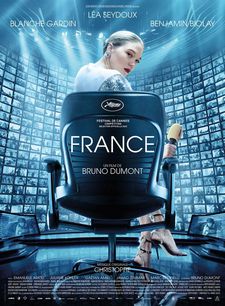 |
| France poster |
BD: I’m going to make a film next year. Each time I make a film I’m trying to make a new film, which is I try not to repeat myself. Since we repeat ourselves, I can make a film. So I’m going to make a film in space. I’m interested very much in space films, you know, in which the United States are a model. It’s a kind of space war, it’s another genre.
AKT: For sure. I’m very much looking forward to it and hope we can add Péguy into space in some form or other!
BD: For sure!
AKT: Thank you, it’s always a pleasure to talk to you!
BD: Thank you, my pleasure!
Coming up - Bruno Dumont on the costumes, repetition and resemblance, the internal self of France and a song with Christophe, a moment of grace and the cinematic expression of the narrative.
France opens theatrically in the US at Film at Lincoln Center on December 10.








